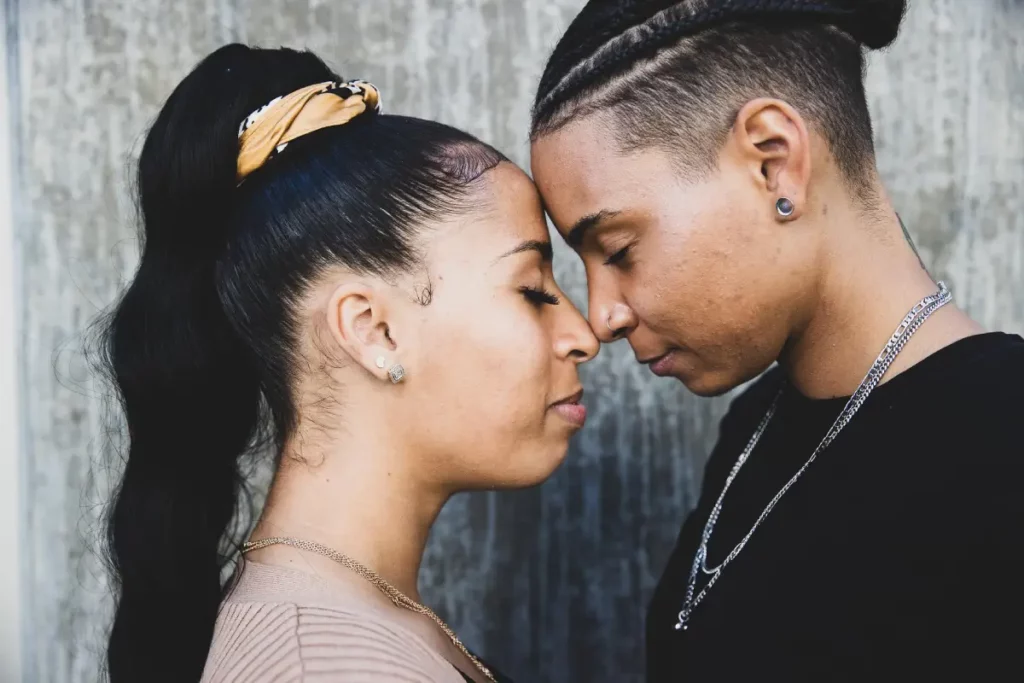Ever wonder what it’s like walking in someone else’s shoes? For lesbian couples, it’s a journey marked with distinctive trials and tribulations that are unique to their experience. In this article, we’ll be delving into the common problems that a lesbian marriage may face, and explore ways to save and strengthen such relationships.
What Are Lesbian Relationships Like?
 In a world filled with a spectrum of colors, lesbian relationships represent a vibrant shade of love. As with all relationships, they are woven from the threads of mutual respect, trust, understanding, and, most importantly, love. However, the experience of a lesbian relationship carries unique perspectives, influenced by the shared experience of womanhood.
In a world filled with a spectrum of colors, lesbian relationships represent a vibrant shade of love. As with all relationships, they are woven from the threads of mutual respect, trust, understanding, and, most importantly, love. However, the experience of a lesbian relationship carries unique perspectives, influenced by the shared experience of womanhood.
At their core, lesbian relationships, like any others, are about connection and intimacy. They’re about two women sharing their lives, building a life together, and supporting one another through thick and thin.
n essence, a lesbian relationship is a deep, loving bond between two women. It’s about shared lives, mutual respect, profound connection, and cherishing each other’s company. They create a tapestry of shared experiences, dreams, and goals, celebrating the love they have for each other.
Common Problems That A Lesbian Marriage May Face
Just as a boat sails through calm seas and turbulent storms, every marriage encounters its fair share of challenges. This analogy perfectly encapsulates the unique set of problems a lesbian marriage often faces.
Unlike heterosexual couples, lesbian marriages carry an additional burden due to societal attitudes and legal nuances. While love forms the backbone of these relationships, the external hurdles often add layers of complexity. So let’s explore these problems and the unique struggles that lesbian marriages often encounter.
Commit Too Fast
 Just as a moth is drawn to a flame, the initial stages of a relationship can be intensely attractive, often causing couples to rush into commitment. This phenomenon, particularly common in lesbian relationships, is often referred to as “U-hauling“.
Just as a moth is drawn to a flame, the initial stages of a relationship can be intensely attractive, often causing couples to rush into commitment. This phenomenon, particularly common in lesbian relationships, is often referred to as “U-hauling“.
This rush into commitment is often fueled by what psychologists refer to as ‘limerence.’ Limerence is an intense emotional state of desire that can make the world seem brighter and everything feel perfect.
Committing too fast can sometimes set unrealistic expectations, as the couple might not have had the chance to see each other’s flaws and weaknesses. When the initial euphoria fades and reality sets in, it can lead to misunderstandings, disappointments, and strained relations.
Thus, while it’s tempting to let the heart take the driver’s seat, it’s essential to let the mind hold the map. Taking time to understand each other, navigating through the initial stages of the relationship, and building a robust emotional connection can pave the way for a healthier, long-lasting marriage.
Maybe She is Not Right for You
 In the romantic tales we grow up with, love always wins, doesn’t it? However, reality often paints a more complicated picture. Just because two people share a gender and sexual orientation doesn’t mean they are automatically compatible. The adage “Maybe she is not right for you” addresses this fact, illustrating that not every relationship is meant to be, and that’s okay.
In the romantic tales we grow up with, love always wins, doesn’t it? However, reality often paints a more complicated picture. Just because two people share a gender and sexual orientation doesn’t mean they are automatically compatible. The adage “Maybe she is not right for you” addresses this fact, illustrating that not every relationship is meant to be, and that’s okay.
Often, individuals rush into or prolong relationships because of the comfort of a shared identity or fear of loneliness. However, over time, differences in life goals, values, communication styles, or emotional needs can surface, creating friction and discontent.
It can be hard to accept that the person you love might not be the right one for you. But forcing a fit could lead to a distorted picture, causing more harm than good.
Understanding that “she might not be right for you” involves recognizing and accepting incompatibilities, regardless of love or attraction. It requires courage to understand that love is not just about finding the right person, but also about building the right relationship.
Giving Yourself Up
 In the pursuit of love and harmony, sometimes individuals end up “giving themselves up,” losing their individuality, which can cause problems in a lesbian marriage.
In the pursuit of love and harmony, sometimes individuals end up “giving themselves up,” losing their individuality, which can cause problems in a lesbian marriage.
Some individuals might alter their interests, opinions, or behaviors to match their partner’s. This can be driven by a desire to avoid conflict, a fear of rejection, or the belief that love means absolute self-sacrifice.
In a lesbian relationship, where societal pressures already add extra stress, the fear of losing a partner who shares and understands your experiences can further encourage self-effacement. Over time, this can lead to a loss of self-identity, with the individual becoming an echo of their partner.
Giving yourself up can silence one of those notes, disrupting the balance and eventually leading to resentment or dissatisfaction. To maintain a healthy relationship, it’s important to cherish your individuality while nurturing your togetherness.
After all, it’s about finding the balance between ‘me’ and ‘us’, acknowledging that you can love another without losing yourself.
You Tend to Be a “Fix It” Girlfriend
 Picture this scenario: you meet someone wonderful, but she’s been through a lot. Her past relationships were a mess, she doesn’t believe in love anymore, and her life seems a bit chaotic. Your heart goes out to her. You think you can help her heal, right? You believe your love can fix things. Well, this is where you might unknowingly step into the role of a “Fix It” girlfriend.
Picture this scenario: you meet someone wonderful, but she’s been through a lot. Her past relationships were a mess, she doesn’t believe in love anymore, and her life seems a bit chaotic. Your heart goes out to her. You think you can help her heal, right? You believe your love can fix things. Well, this is where you might unknowingly step into the role of a “Fix It” girlfriend.
In a lesbian relationship, shared experiences might make you feel an even stronger urge to help your partner. After all, you understand her struggles in a unique way. However, this “Fix It” habit might create more difficulties rather than solving them.
Trying to fix someone could result in unintended pressure and make them feel inadequate or misunderstood. It could rob them of their personal growth journey and breed resentment or dependence in the relationship.
Instead of trying to fix things, it’s healthier to offer emotional support and encouragement, to help your partner find her own strength and solutions. In the end, everyone has their battles to fight and lessons to learn; we can offer support, but we can’t fight those battles for them.
Assumptions Can Be The Main Source
 Assumptions involve drawing conclusions based on incomplete information. For example, in a lesbian relationship, the common assumption that “she is a woman, so she must understand me because we’re the same gender” can further fuel this behavior.
Assumptions involve drawing conclusions based on incomplete information. For example, in a lesbian relationship, the common assumption that “she is a woman, so she must understand me because we’re the same gender” can further fuel this behavior.
However, assumptions are like a mirage; they appear real but lack substance. They can lead to misunderstandings, confusion, and hurt feelings. Imagine expecting a loved one to remember your birthday based on subtle hints. If they forget, you’re left feeling disappointed and they are bewildered by your upset.
Assumptions undermine the importance of open communication in a relationship. They create a world of unspoken expectations and unverified beliefs, which can create a disconnect between partners.
Lesbian Bed Death
 Have you ever seen a vibrant, healthy plant gradually wilt away despite being watered regularly? Similarly, in a relationship, despite love and care, certain factors can lead to a decline in intimacy or sexual activity, often referred to as “Lesbian Bed Death.”
Have you ever seen a vibrant, healthy plant gradually wilt away despite being watered regularly? Similarly, in a relationship, despite love and care, certain factors can lead to a decline in intimacy or sexual activity, often referred to as “Lesbian Bed Death.”
This term, while controversial, refers to a perceived tendency toward a decrease or total cessation of sexual activity in longer-term lesbian relationships. When we examine what contributes to Lesbian Bed Death, it’s like tracing a line back to the problems we’ve previously mentioned.
For instance, when individuals commit too fast, the novelty can wear off quickly, leading to a decline in passion and desire. If a partner is not the right fit, the mismatch in sexual desires or communication styles can impact the sexual health of the relationship. Thus, Lesbian Bed Death can be seen as a potential symptom of the various lesbian marriage problems discussed above.
Tips to Save Your Marriage From Failing
 Just as every problem has a cause, it also has a solution. Relationships, including lesbian marriages, are no different. Despite the challenges that can arise, there are several ways you can bolster your relationship’s health and longevity. So, here are some tips to help you save your relationship from failing:
Just as every problem has a cause, it also has a solution. Relationships, including lesbian marriages, are no different. Despite the challenges that can arise, there are several ways you can bolster your relationship’s health and longevity. So, here are some tips to help you save your relationship from failing:
- Slow Down: Falling in love can be thrilling, but rushing into commitment can lead to an unstable foundation. Take time to understand each other and build a strong emotional bond before making serious commitments.
- Know Yourself and Your Partner: Remember, you are two distinct individuals. Understand your values, desires, and expectations, and allow your partner the same. Encourage open conversations about each other’s needs and expectations to avoid misunderstandings and dissatisfaction.
- Maintain Individuality: It’s important to nurture your personal growth and hobbies even while in a relationship. Healthy relationships involve two individuals growing together, not losing themselves in each other.
- No Fixing, Only Supporting: Instead of trying to ‘fix’ your partner, offer emotional support. Encourage her to find her own solutions, respect her journey, and be there for her without infringing on her self-growth.
- Communication is Key: Clear, honest communication is the cornerstone of a healthy relationship. Share your thoughts and feelings openly, and encourage your partner to do the same. Don’t let assumptions guide your actions.
- Keep the Spark Alive: Work on maintaining emotional and physical intimacy in your relationship. Plan date nights, surprise each other, and explore new activities together. Variety and mutual effort can keep the spark alive.
- Seek Professional Guidance or Therapy: Sometimes, despite your best efforts, you might find yourself stuck in patterns you cannot break out of, or emotions you cannot navigate. In such cases, seeking professional help can be very beneficial.
Remember, every relationship has its ups and downs. The key lies in navigating these times with patience, understanding, and love. As you implement these tips, you’ll be better equipped to steer your relationship towards healthier, happier ones.
Conclusion
In the vast panorama of human relationships, each one is unique and carries its own set of problems and rewards. Lesbian relationships, while sharing many commonalities with other types of relationships, face certain distinctive problems.
However, it’s essential to remember that challenges are not dead ends, but opportunities for growth and understanding. So, whether you’re embarking on a new relationship or nurturing an existing one, these insights and tips can help you navigate the unique journey of a lesbian relationship, ultimately helping you build a bond that withstands the tests of time.
Life may sometimes be challenging if you are a lesbian, but Online Lesbian Counseling can help. Get experienced LGBTQ therapists at PrideMantra: Book a trial LGBTQ therapy session


